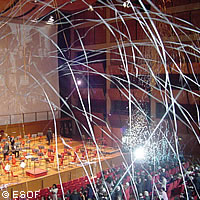Marie Curie Actions fuel fight against brain cancer
The European drive to fight brain cancer continues, and the EU is reinforcing this effort by providing funding to an Italian scientist who is pioneering a new treatment that could help squash this disease. Milo Malanga, currently working with scientists and researchers at Cyclolab in Hungary, presented details of his new research into the development of an anti-cancer drug based on cyclodextrins (a family of compounds made up of sugar molecules) at the Marie Curie Conference in Turin, Italy on 2 July. Mr Malanga's work is part of the CYCLON ('Novel multifunctional cyclodextrin-based nanocarriers for drug encapsulation and delivery as a strategy to overcome current therapeutic drawbacks') project, which is backed with more than EUR 2.4 million under the Marie Curie Action - Networks for Initial Training of the EU's Seventh Framework Programme (FP7). The CYCLON partners will release their results in 2013, when the project comes to an end. Coordinated by the National Centre for Scientific Research 'Demokritos' in Greece, CYCLON brings together experts from France, Hungary, Iceland, Italy, Spain and Sweden. 'State-of-the-art drugs to fight different types of brain cancer are, unfortunately, scarce and not as effective as they should be to ensure an acceptable degree of success,' Mr Malanga said, adding that if the work being carried out at Cyclolab 'bears the expected fruit, the new anti-cancer drugs might be developed by 2013'. Experts say that researchers must develop drugs that can kill cancerous cells but also safeguard the healthy ones. Another headache for them is getting past the brain's layer of high-density cells, commonly known as the 'blood-brain barrier', which keep existing anti-cancer treatments from doing their job. Mr Malanga, along with 398 research fellows attended the Marie Curie Conference in the northern Italian city, in the margins of the 2010 EuroScience Open Forum (ESOF). The main objective of the conference was to provide EU-funded scientists and researchers with information they could use to fuel their experiences and boost their knowledge. The EU has earmarked over EUR 4.5 billion for the Marie Curie Actions scheme for the period from 2007 to 2013. For the last 14 years, Marie Curie Actions have been instrumental in fuelling the creation of the European Research Area (ERA). The new Research Executive Agency (REA), launched by the EU to manage parts of FP7, oversees the management of the Actions. 'I hope Milo Malanga and his colleagues succeed in developing a drug that could save thousands, if not millions, of lives,' said EU Commissioner for Education, Culture, Multilingualism and Youth, Androulla Vassiliou, who is responsible for the Marie Curie Actions fund. 'I'm proud that the EU is contributing to their work, which is an excellent example of the added value of European funding in support of research,' she added. 'The Marie Curie scheme brings together the best talents in higher education and research so that knowledge moves freely across borders and stimulates innovation and new ideas, which are the lifeblood of progress in healthcare and many other areas.' EU Research, Innovation and Science Commissioner Máire Geoghegan-Quinn will address ESOF on 3 July. Her talk will focus on how the European Commission's forthcoming Innovation Union Strategy will help advance science and sustain prosperity. Also on the agenda is how the new strategy of the Joint Research Centre (JRC) will also support these objectives.
Countries
Greece, Spain, France, Hungary, Iceland, Italy, Sweden



